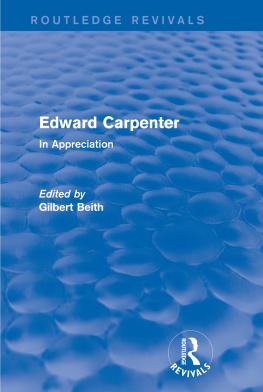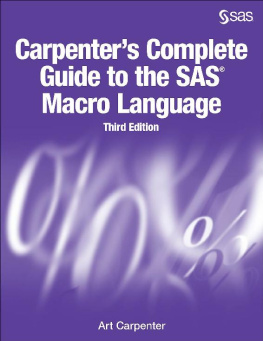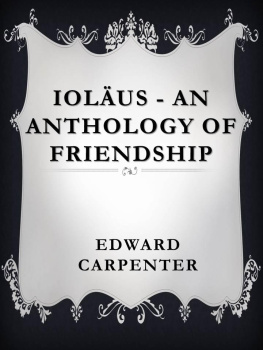Transcriber's Note:
Obvious typographic errors have been corrected.
CIVILISATION: ITS
CAUSE AND CURE
CIVILISATION: ITS
CAUSE AND CURE
AND OTHER ESSAYS
(NEWLY-ENLARGED AND COMPLETE EDITION)
BY
EDWARD CARPENTER
AUTHOR OF "TOWARDS DEMOCRACY,"
"MY DAYS AND DREAMS," ETC.
logo
LONDON: GEORGE ALLEN & UNWIN LTD.
RUSKIN HOUSE, 40 MUSEUM STREET, W.C.1
First Edition, June 1889; Second Edition, December 1890;
Third Edition, November 1893; Fourth Edition, July 1895;
Fifth Edition, September 1897; Sixth Edition, October 1900;
Seventh Edition, July 1902; Eighth Edition, March 1903;
Ninth Edition, January 1906; Tenth Edition, January 1908;
Eleventh Edition, October 1910; Twelfth Edition, Dec. 1912;
Thirteenth Edition, Aug. 1914; Fourteenth Edition, June 1916;
Fifteenth Edition, Sept. 1917; Complete Edition, Jan. 1921
(All rights reserved)
PREFACE TO COMPLETE EDITION (1920)
In looking over this volume, first published in 1889, with a view to a final Edition, I am glad to note that after all there is not much in it requiring alteration. Considering that the original issue took place more than 30 years ago, I had thought that the great changes in scientific and philosophic thought which have taken place during that period would probably have rendered "out of date" a good deal of the book.
As a matter of fact, the first paperthat on Civilisationwas given as a lecture before the Fabian Society, in 1888; and I shall not easily forget the furious attacks which were made upon it on that occasion. The bookpublished as a whole in 1889came in for a very similar reception from the press-critics. They slated it to the top of their bentexcept in those not unfrequent cases when they ignored it as almost beneath notice. The whole trend of the thought of the time was against its conclusions; and it is perhaps worth while to recall these facts in order to measure how far we have travelled in these 30 years. For to-day (I think we may say) these conclusions are generally admitted as correct; and the views which seemed so hazarded and precarious at the earlier date are now fairly accepted and established.
The word Civilisation has undoubtedly during this period suffered an ominous change of color. It is no longer an easy term denoting all that is ideal and delightful in social life, but on the contrary, carries with it a sense of doubt and of criticism, as of something that is by no means accepted yet, but is rather on its trialif not actually condemned!
I am sorry to note, however, that the suggestion made more than once in the course of my booknamely that the term (Civilisation) should properly be given an historical instead of ideal value, as applicable to a certain period only in the history of each people, has not yet been generally taken up. Yet a paper by some more competent person than myself on the definite marks and signs of the civilisation-period in Historytheir first appearance in the course of human progress and evolution, and their probable disappearance again at a later stagewould be greatly interesting and instructive.
My little essay on this subject was written at the time of its composition with a good deal of imaginative lan; and is of course open to criticism on that side, as being mainly enthusiastic in character and only slenderly supported by exact data, proofs, historical illustrations, analogies, and so forth. But to largely alter or amend the essay without seriously crippling it would be impossible; and though the form may be hurried or inadequate, yet as far as the actual contents and conclusions are concerned I still adhere to them absolutely, and believe that time will show them to be fully justified.
With regard to my views on Modern Science the last quarter of a century has curiously corroborated them. For while on the one handas expectedthe progress in actual discovery and application of observed facts has been enormous, the theories on the other hand about all these things have receded more and more into the background, and have passed almost out of sight. While knowing, for instance, infinitely more about electrical actions and adaptations than we did, we seem to be if anything further off than ever from any valid theory of what Electricity is. The same with regard to Heat and Light, to Astronomical, Biological and Geological "laws," and so forth. On such matters Modern Science is on the verge of confessing itself bankrupt, but not wishing to do that, it keeps a discreet silence.
The Atom, which I ventured (to the disgust of my scientific friends) to make fun of 30 years ago, has now exploded of itself as thoroughly as a German "coal-box"; and the fixed Chemical Elements of older days have of late dissolved into protean vapours and emanations, ions and electrons, impossible to follow through their endless transformations. As to the numerous "Laws of Nature" which in the nineteenth century we were just about to establish for all eternity, it is only with the greatest difficulty that any of these can now be discoveredmost of them having got secreted away into the darkness of ancient text-books: where they lead forlorn and sightless existences, like the fish in the caves of Kentucky.
Here againin my chapters on Sciencethough some expressions remain which are now out of date, I have thought it best to leave them as originally written: the meanings and general conclusions being still valid and as they were. It will be seen that the general drift of these chapters is to point the moral that the true field of science is to be found in Life, and that the best way to know things is to experience their meaning and to identify oneself with them through Action. From a study on these principles will ultimately emerge a Science truly humane and creative, masterful, and capable of building a true home for meninstead of the feverish, spectral and self-deluding thing which has usurped the name up to now.
Something the same will happen with the conception of Morality. The abstract codes on this subject, which have wrought so much havoc by their fatal intrusion on the field of human Life, are rapidly fading away. These ghosts, like the ghosts of Nature's "Laws," are receiving their quietus. And the general outline which was suggested in "The Defence of Criminals" has now been traced more positively in the chapter on "The New Morality" inserted at the end of the present volume. Morality has at last to become truly human, and the real expression of our organic need. Man has to be liberated from the cramps and suppressions and fixations which have hitherto paralysed him in the moral field. He has to emerge from the swathing bands of his pupal stage into the free air of heaven, and to become in the highest sense self-determining and creative.
Thus three things, (1) the realisation of a new order of Society, in closest touch with Nature, and in which the diseases of class-domination and Parasitism will have finally ceased; (2) the realisation of a Science which will no longer be a mere thing of the brain, but a part of Actual Life; and (3) the realisation of a Morality which will signalise and express the vital and organic unity of man with his fellowsthese three things will become the heralds of a new era of humanityan era which will possibly prefer not to call itself by the name of Civilisation.
In order to corroborate and confirm the first paper in the book an Appendix has now been added containing notes and










